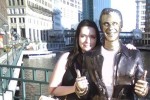A singer’s take on Emma Kirkby
I had the good fortune to sing in Dame Emma Kirkby’s master class Monday at UWM.
Kirkby is a world-renowned soprano and famed interpreter of early music. A BBC Music Magazine survey of critics put her at number 10 on the list of the 20 singers since the beginning of recording. She’s a big deal.
Tuesday night, Kirkby and lutenist Jakob Lindberg gave a concert of songs by Henry Purcell and John Dowland, giants of the English Baroque, on the Early Music Now series.
Kirkby wasted nothing that Purcell and Dowland gave her. She parsed and arranged every word, every phrase, and even every rest into arresting little vignettes. Repertoire that could seem repetitive when performed by someone else revealed its diversity,given the advantage of Kirkby’s thoughtful interpretation.
Again, someone might want to tell her that she’s a big deal. She sat in a chair next to Lindberg for most of the concert, making it clear that this was a true collaboration rather than a soprano with her accompanist. She listened intently to Lindberg’s solos. Her faced registered Lindberg’s every turn of phrase. No sense of “diva” at all.
In the master class, Kirkby spoke at length with us about diction and how it can convey not only the meaning of the text but also its emotion. In concert, her diction was flawless. Every ridiculous early English word could be understood. Kirkby utilized consonants and vowels – the subtleties of attack on consonants, the edge of nasality or ring of resonance on a vowel — to color the story of the text. This was especially evident in pieces such as “Farewell unkind farewell,” where a consonant’s presence or absence opened a window into the protagonist’s emotions.
In the masterclass, Kirkby spoke with my friend, mezzo-soprano Rebecca Davies, and I at great length about utilizing chest resonance in our Strozzi duet. This surprised me. It’s early music, right? Isn’t is supposed to be a bit stilted? The opera world seems convinced that healthy singing and early music are mutually exclusive. But here was Emma Kirkby herself imparting the type of advice many proponents of relatively later bel canto style would give to young singers.
At the concert, you could hear and see Kirkby use her entire body for vocal production and to aid in interpretation, from full chest voice in imitation of a moan to the straightest and lightest of tones.
For Kirkby, there is only the text and the music. For the six of us lucky enough to sing for her, there was only inspiration.
I really should be practicing.
The Kirkby-Lindberg program took place in the Schwan Concert Hall of Wisconsin Lutheran College.
Other Reviews: Elaine Schmidt.
























This month’s issue of Classical Singer was entirely about early music performance. The whole “sing with a different technique” idea is dead. And thank GOD for that.
Thanks for this, Barbara. By the way, I’m a little sleepy today.
Me, too!
Thanks for the opportunity, Tom.
Thank you!
The master class was fabulous – even for a guitarist who barely understands singing. The effect Kirkby had on each singer was audible – remarkable improvements in some singers who were already pretty darn good!
I loved the concert as well. I was in the second row and really felt I heard/saw Kirkby do all the things she talked about in the master class. Yes, she is definitely quite a singer!
I was surprised at how soft the lute sound was (or I’m going deaf). But what a great instrument – imagine something built in 1590 still being played so well!
I think, thankfully, that the days of the two worlds (opera and early music) being mutually exclusive are dead.
Barbara – thanks for this eloquent description of a remarkable experience. Glad you were part of it, and welcome to TCD!